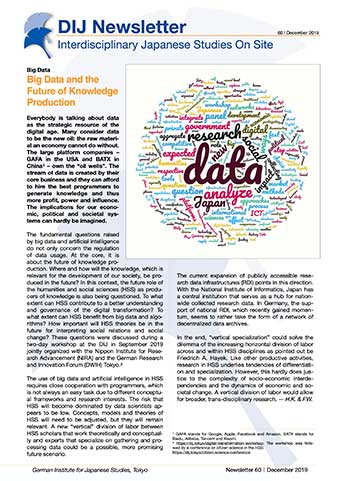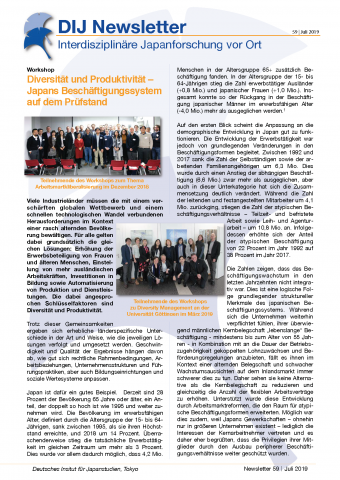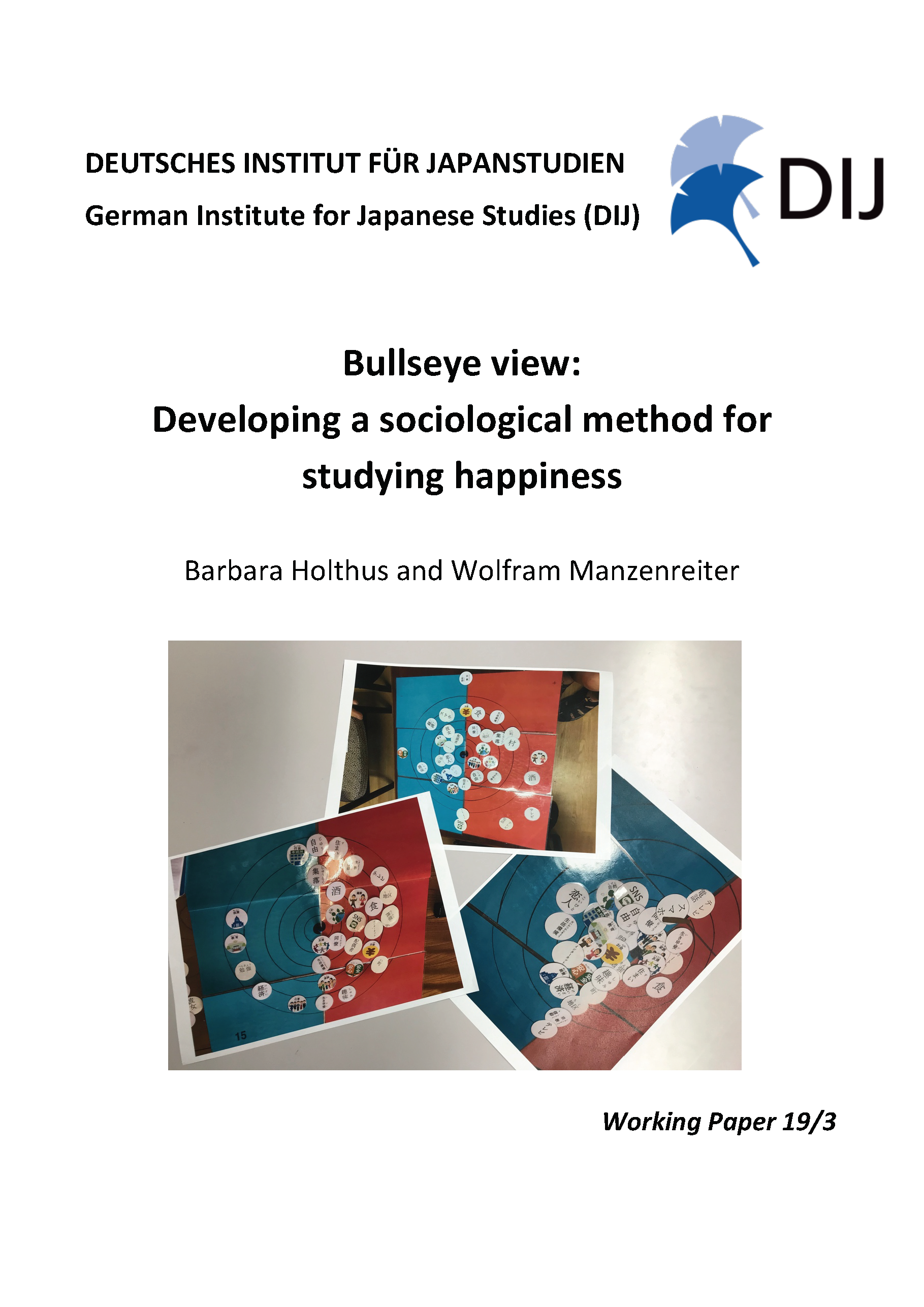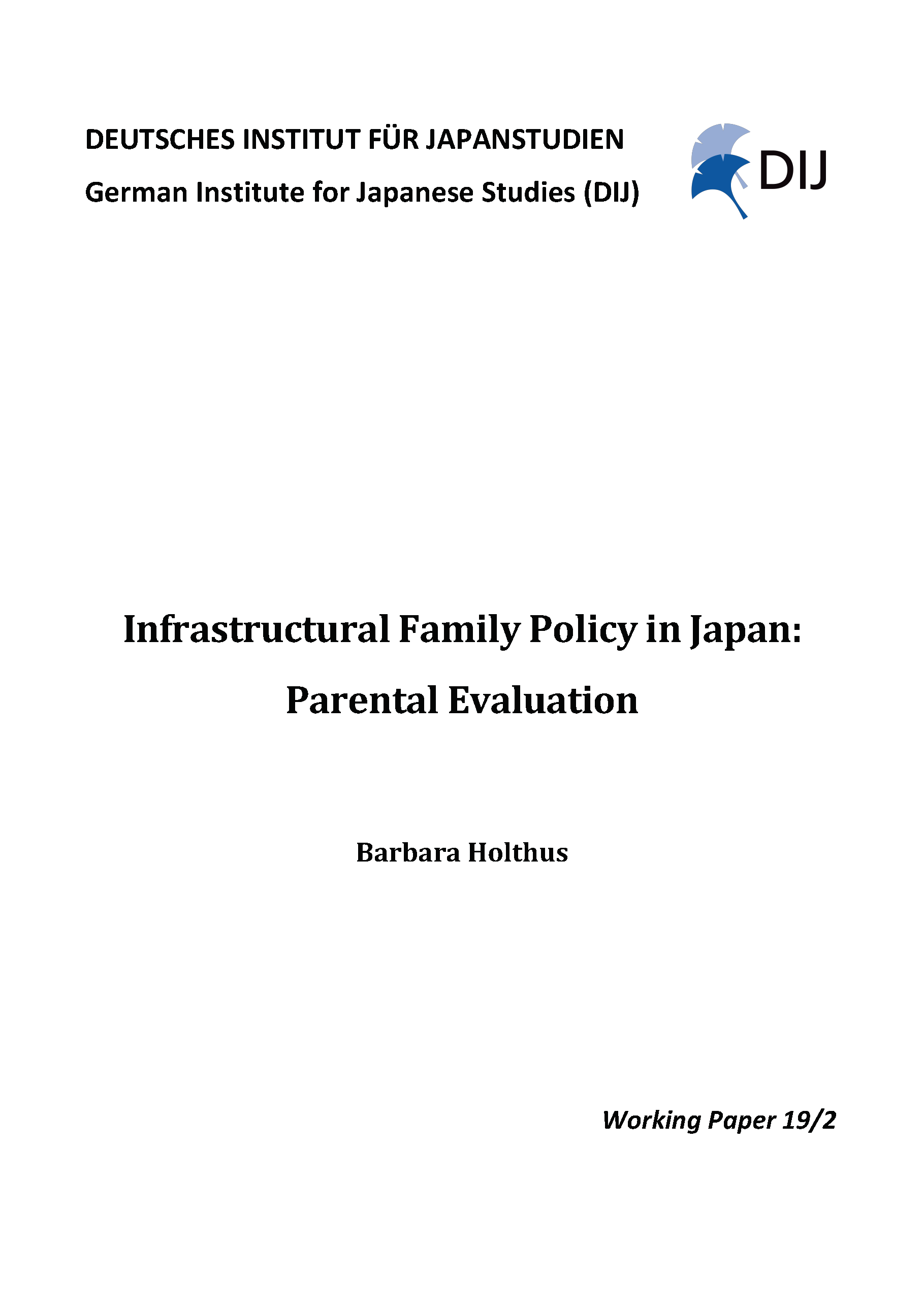イベント&アクティビティ
DIJ Newsletter 60 published
 Big Data and the Future of Knowledge Production
Big Data and the Future of Knowledge Production
Daten als Ressource des digitalen Zeitalters sind in aller Munde. Viele sehen in ihnen das neue Öl: Den Rohstoff, ohne den eine Wirtschaft in Zukunft nicht mehr auskommt. Die damit angesprochenen grundlegenden gesellschaftspolitischen Fragen betreffen nicht allein die Regulierung des Umgangs mit Daten. Es geht darüber hinaus auch um die Zukunft der Produktion von Wissen. Wo und wie wird das zukünftig für die Entwicklung unserer Gesellschaft relevante Wissen produziert?
Studying Japan
Im Juli 2019 versammelte sich eine interdisziplinäre Gruppe von 27 Japanforschern aus Australien, Europa, Japan, Singapur und den USA in Berlin, um über Chancen und Herausforderungen der Japanforschung zu diskutieren. Vier Panels behandelten den gesamten Forschungsprozess – von der Suche nach einer Forschungsfrage über Datenkollektion und -analyse bis hin zur Veröffentlichung der Ergebnisse.
Besonders aufschlußreich waren auch Diskussionen über den Einfluss neuer Technologien auf die Forschung.
Die vielfältigen Ergebnisse werden in das Methodenhandbuch Studying Japan – herausgegeben von Nora Kottmann und Cornelia Reiher – einfließen.
Neues Kulturwissenschaftsprojekt
Das Projekt „Theater und Gesellschaft in Japans Regionen“ untersucht, wie zentrale Fragen der japanischen Gesellschaft in regionalen Theaterproduktionen repräsentiert und verhandelt werden. Das Projekt basiert auf aktuellen Konzepten von Theater als Raum für soziale Debatten. Welche Themen werden angesprochen und auf welche Weise künstlerisch umgesetzt? Was kann Kunst und Kultur bei der Bewältigung sozialer Fragen leisten und welche Rolle spielen sie für die Stärkung des ländlichen Raumes?
Contemporary Japan, Volume 31, Issue 2
 This issue starts with a Special Section on “Emotions and Affect in Studies on Contemporary Japan,” featuring original research articles on cutting edge topics including the dynamics of conversion to right-wing ideologies, the emotional toll of providing care for left-wing political prisoners, and the struggles in “coming out” for families of LGB individuals, prefaced with an introduction by Barbara Holthus grounding the studies in the sociology of emotion.
This issue starts with a Special Section on “Emotions and Affect in Studies on Contemporary Japan,” featuring original research articles on cutting edge topics including the dynamics of conversion to right-wing ideologies, the emotional toll of providing care for left-wing political prisoners, and the struggles in “coming out” for families of LGB individuals, prefaced with an introduction by Barbara Holthus grounding the studies in the sociology of emotion.
We also have three original articles covering topics that range from an analysis of historical memory in Yū Miri’s JR Ueno Station Park Exit, the shifting identity narratives of the Tokyo 2016 and Tokyo 2020 Olympic bids, and how katakana is used by discourse producers to communicate nuanced perspectives.
DIJ Newsletter 59 published
 Report: Diversity and productivity – Japan’s employment system at the crossroads
Report: Diversity and productivity – Japan’s employment system at the crossroads
Many advanced economies have to cope with increased global competition and fast technological change while being confronted with a rapidly ageing workforce. For all of them, basically the same solutions apply: increasing the labor participation of women and elderly persons, hiring more foreign workers, investing in education and training, and advancing the automation of production and services. The common key variables underlying or addressed by these measures are diversity and productivity.
New Era: Japan’s new era has a name: Reiwa
It was no April Fool’s Day joke: on April 1st, chief cabinet secretary Yoshihide Suga announced Reiwa as the new Japanese nengō (also gengō). On May 1st, 2019, the new Emperor Naruhito has ascended the throne on under this new era name which could be translated as “Rule Japan” or “administered peace”.
DFG-funded Research Project: Nanjing War Diaries
When Japanese troops in autumn 1937 advanced to the Chinese capital of Nanjing, the German representative of the Siemens Company, John Rabe (1882-1950), decided to remain in the city.
Governance in the Age of Ignorance: The Role of Knowledge Infrastructures

Franz Waldenberger, director of DIJ, was invited to contribute to the magazine for the G20 meeting held in Osaka, June 28 to 29. His article can be found on page 42-43 in the digital versions of the magazine under the links below:
Bullseye view: Developing a sociological method for studying happiness
 Happiness research has gained tremendous popularity, yet research by anthropologists and sociologists trails behind in comparison to economists and psychologists. A sociological study that aims to understand the multidimensionality of happiness in Japan by focusing on a culture-sensitive understanding of happiness remains a desideratum. Therefore we developed a three-partite approach to studying happiness and life satisfaction: (1) word association, (2) in-depth conversation on happiness and life satisfaction issues using a bullseye-structured chart, which we refer to as “board game”, with tokens for visualization of dimensions’ overall importance, and satisfaction and dissatisfaction with them, (3) three quantitative questions on happiness, followed by in-depth discussion to tie to the multitude of existing quantitative studies. To test the methodology, we conducted 23 semi-structured interviews with Japanese men and women in rural Japan. We find that happiness is multidimensional, is an interpretative process, varies over the life course, and that the desire to maximize happiness is not universal. We argue to have created a methodology which we believe can be modified to be used in any country and with diverse population groups, while remaining culture-sensitive throughout.
Happiness research has gained tremendous popularity, yet research by anthropologists and sociologists trails behind in comparison to economists and psychologists. A sociological study that aims to understand the multidimensionality of happiness in Japan by focusing on a culture-sensitive understanding of happiness remains a desideratum. Therefore we developed a three-partite approach to studying happiness and life satisfaction: (1) word association, (2) in-depth conversation on happiness and life satisfaction issues using a bullseye-structured chart, which we refer to as “board game”, with tokens for visualization of dimensions’ overall importance, and satisfaction and dissatisfaction with them, (3) three quantitative questions on happiness, followed by in-depth discussion to tie to the multitude of existing quantitative studies. To test the methodology, we conducted 23 semi-structured interviews with Japanese men and women in rural Japan. We find that happiness is multidimensional, is an interpretative process, varies over the life course, and that the desire to maximize happiness is not universal. We argue to have created a methodology which we believe can be modified to be used in any country and with diverse population groups, while remaining culture-sensitive throughout.
NIRA オピニオンペーパー no.43 /2019 .Feb
21世紀の「資源」: ビッグデータ
―技術、ビジネス、法の観点から考える―
NIRA 総研はドイツ日本研究所との共催で、2018年11月1日に「ビッグデータ」ワークショップを開催。実務家や研究者、政府関係者など、多彩なポジションのスピーカーが、ビッグデータの特徴や問題点を語った。
✓ ビッグデータは21世紀の「資源」といわれ、20世紀に成長をけん引した石油にも比される。ビッグデータが「資源」となるために必要なものは何か。
✓ IoT モジュールなど最新の技術開発が先進的なサービスを可能にする一方、AI がもたらすバイアスなどの負の影響をどう考えるべきか。
✓ ビッグデータを活用したビジネスを開花させるために、企業や個人が安心してデータを共有、取引する仕組みは何か。企業や政府は、この課題にどう取り組んでいるのか。
✓ データの特性を踏まえた制度の構築、すなわち、巨大プラットフォーマーによるデータ市場の独占や、個人のプライバシー保護についての規制や制度はいかにあるべきか。
今回の議論から、新しい価値を生むための技術の構築、ビジネスを活発化させるためのデータ取引や集約の仕組みづくり、そして石油にはないデータの特性を踏まえた制度の整備に早急に取り組む必要があることが浮き彫りとなった。
ワークショップ: Big Data – the new competitive paradigm. How well is Japan prepared?
Infrastructural Family Policy in Japan: Parental Evaluation
 The continuing low fertility rate in Japan, coupled with high ageing is a severe problem for Japan’s social welfare system and its economy. One important element of family policies is to provide affordable and good quality childcare institutions. In international scholarship on the evaluation of family policies, surveying parents specifically in regard to their satisfaction with family policies is rare. For the case of Germany, studies find daycare expansion positively associated particularly with maternal subjective well-being, with some differences between parents in West and East Germany, as well as that parents’ education, their income, and the age of the child all impact their levels of satisfaction with family policies. Mirroring the study by Camehl et al. (2015) and applying this to the case of Japan, I conducted a quantitative analysis of the JPWS 2012 (Japan Parental Well-Being Survey) data. Findings are that Japanese mothers’ and fathers’ own experiences are an important indicator for their satisfaction with family policies. If they managed to secure a childcare space, in particular in a public daycare center, they are more likely to be satisfied with family policies. A place in a public daycare center in contrast to any other childcare institution contributes most significantly to the parents’ satisfaction with family policies.
The continuing low fertility rate in Japan, coupled with high ageing is a severe problem for Japan’s social welfare system and its economy. One important element of family policies is to provide affordable and good quality childcare institutions. In international scholarship on the evaluation of family policies, surveying parents specifically in regard to their satisfaction with family policies is rare. For the case of Germany, studies find daycare expansion positively associated particularly with maternal subjective well-being, with some differences between parents in West and East Germany, as well as that parents’ education, their income, and the age of the child all impact their levels of satisfaction with family policies. Mirroring the study by Camehl et al. (2015) and applying this to the case of Japan, I conducted a quantitative analysis of the JPWS 2012 (Japan Parental Well-Being Survey) data. Findings are that Japanese mothers’ and fathers’ own experiences are an important indicator for their satisfaction with family policies. If they managed to secure a childcare space, in particular in a public daycare center, they are more likely to be satisfied with family policies. A place in a public daycare center in contrast to any other childcare institution contributes most significantly to the parents’ satisfaction with family policies.
Furthermore, the region of living is a highly significant factor. Parents in the urban metropolitan areas of Kanto and Kinki are significantly less satisfied—due in part to the fact that in these urban areas daycare spaces are more difficult to get than in anywhere else. In regards to infrastructural family policy satisfaction, gender differences in satisfaction pale in comparison to regional differences. it is hoped that policy makers will acknowledge the importance of evaluating the “success” of family policies by the level of satisfaction of parents with family policies, and that the diverse conditions and needs of families in different regions be adequately addressed.
Dreaming of Being a Chef? The Overseas Mobility of Young Japanese Women and Their Employment in Düsseldorf’s Japanese Foodscapes
 The temporary and permanent presence of numerous Japanese citizens in Dusseldorf is certainly one of the reasons why the offerings of Dusseldorf’s ‘Japanese’ food sector are particularly extensive and diverse in comparison to other German cities. In spite of increasing academic interest in the growing Japanese foodscapes, in Japanese communities abroad, and in the overseas mobility of Japanese women, so far there is almost no research on the relationship among these topics.
The temporary and permanent presence of numerous Japanese citizens in Dusseldorf is certainly one of the reasons why the offerings of Dusseldorf’s ‘Japanese’ food sector are particularly extensive and diverse in comparison to other German cities. In spite of increasing academic interest in the growing Japanese foodscapes, in Japanese communities abroad, and in the overseas mobility of Japanese women, so far there is almost no research on the relationship among these topics.
Düsseldorf and the (young) women who work in gastronomy there offer an interesting case study in this context. Using qualitative data from a field study in Dusseldorf’s ‘Japanese’ foodscapes from 2016 onwards, this article focuses on young Japanese women working in this sector.

















 Open Access
Open Access
